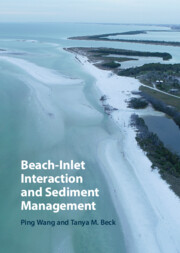Book contents
- Beach–Inlet Interaction and Sediment Management
- Beach–Inlet Interaction and Sediment Management
- Copyright page
- Contents
- 1 Introduction
- 2 Beach and Inlet Systems under Different Geological and Oceanographic Settings
- 3 Hydrodynamics and Sediment Processes Applicable to Beach–Inlet Systems
- 4 Sedimentology and Morphodynamics of Beach–Inlet Systems
- 5 Interaction of Beaches and Inlets
- 6 Methods to Mitigate Beach Erosion and Ensure Inlet Navigation Safety
- 7 Regional Sediment Management at Beach–Inlet Systems
- 8 Resiliency of Beach–Inlet Systems Facing Sea-Level Rise, Storm Impacts, and Human Stresses
- References
- Author Index
- Subject Index
5 - Interaction of Beaches and Inlets
Published online by Cambridge University Press: 15 September 2022
- Beach–Inlet Interaction and Sediment Management
- Beach–Inlet Interaction and Sediment Management
- Copyright page
- Contents
- 1 Introduction
- 2 Beach and Inlet Systems under Different Geological and Oceanographic Settings
- 3 Hydrodynamics and Sediment Processes Applicable to Beach–Inlet Systems
- 4 Sedimentology and Morphodynamics of Beach–Inlet Systems
- 5 Interaction of Beaches and Inlets
- 6 Methods to Mitigate Beach Erosion and Ensure Inlet Navigation Safety
- 7 Regional Sediment Management at Beach–Inlet Systems
- 8 Resiliency of Beach–Inlet Systems Facing Sea-Level Rise, Storm Impacts, and Human Stresses
- References
- Author Index
- Subject Index
Summary
Building upon regional scale discussions in Chapter 2, this chapter discusses the interactions between barrier beaches and tidal inlets at a local scale from the perspective of inlet stability, and mechanisms and pathways of sediment bypassing across tidal inlets. Inlet stability can be significantly influenced by local geologic conditions such as outcropping of erosion resistant bedrocks or stiff mud, in addition to hydraulic conditions as controlled by tidal prism. Local geology such as shoreline exposure of bedrocks and stiff mud can also influence beach morphodynamics by controlling its planform. However, tidal inlets and their ebb tidal deltas impose the major interruption to the continuity of longshore sand transport. How sand moving along the beach can reach from one barrier island to another constitutes the main issue for beach–inlet interaction, and subsequently the erosion or accretion of barrier beaches. Several conceptual models have been developed and are discussed in this chapter. The rapidly improving numerical modeling provides a promising tool to quantify sediment bypassing and is introduced here.
Keywords
Information
- Type
- Chapter
- Information
- Beach-Inlet Interaction and Sediment Management , pp. 134 - 181Publisher: Cambridge University PressPrint publication year: 2022
